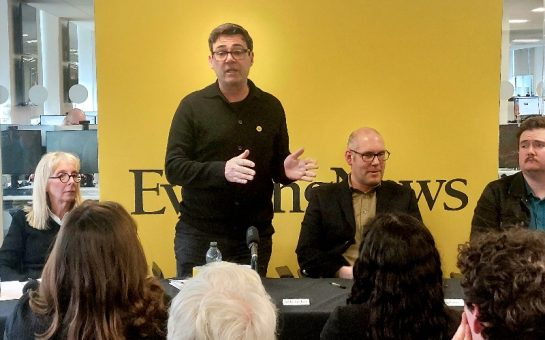An unemployed gardener desperate for work killed himself in his Bury home after an unsuccessful meeting at his local Jobcentre left him ‘demoralised’ and feeling like a ‘statistic’.
Hard working Martin Hadfield, 20, was so keen to get a job he refused to claim any welfare hand-outs and applied for 40 posts in the space of three months.
But he failed to get responses on almost every application after being ‘undercut’ on wages by younger and more inexperienced candidates.
According to his family his period out of work and government red tape left him feeling ‘put down with no self-worth’.
Just 24 hours after a meeting where job centre staff invited him to a follow up meeting, Martin was found hanged at his flat in Tottington, near Bury, Greater Manchester.
Today following an inquest into his death the youngster’s stepfather Peter O’Gorman, 47, a car valeter, said: “Martin was obviously never a statistic to us but in the last months of his life he became a statistic to other people.
”He was a statistic by being out of work, a statistic when he went into the job centre and now he a statistic by killing himself.
”Sadly this statistic seems to be growing especially in boys Martin’s age who are struggling in the current climate, or struggling with life and they forget to think about talking to someone.”
Mr O’Gorman said his step-son was hard-working and too proud to let his family know just hour dour his situation had left him feeling.
“On the day he died his mum gave him some money for the bus home and instead he walked the 5 miles home and saved it for something important,” he said.
“That was the kind of boy he was, hardworking and with so much potential.
”Martin never claimed any money or benefits in his life as parents we could help him out until he got on his feet. He got nothing off the government and was proud not to.”
He says Martin hated the idea of going to the Jobcentre because he had heard so many off-putting stories from people his own age.
“Many people go in with a sense of self-worth – they really do want a job – but come out feeling demoralised and putdown,” he said.
“There seems a stereotype surrounding youngster between 18 and 25 who go into job centres. There are some people in that age group who don’t want work but there are plenty who are eager to work and earn a living.”
Martin, originally from Greenoch Scotland, left school with GCSEs and after helping his stepfather valet cars got a job as a landscape gardener and achieved NVQ qualifications.
But in April last year he lost his job due to the firm down-sizing.
Mr O’Gorman added: ”Martin was a real hard grafter. He hated being out of work or sitting at home doing nothing.
“When work was dead he would never just sit on his bum, he would go off and look for work. If he could have worked 7 days a week he would have.”
When he lost his job, Martin searched for work, Mr O’Gorman said, and had been waiting on phone calls back from all the applications he sent out.
“It just seemed firms wanted to hire younger workers for lower wages,” he said.
”If there was a younger lad, with nowhere near the flair or experience of Martin, who cost just a tenner, he would get the job.
“Martin was heartbroken by it and heartbroken every time he walked past the gardens he used to tend and see them in disrepair. He took such pride in his work.”
Mr O’Gorman said his step-son applied for at least 30 or 40 jobs. He added: “His dad and sister would help him with his CV too. He wasn’t fussy, he would have taken anything just to be working and on the employment ladder.
”But I have heard from so many people that the job centre experience is very demoralising. The human touch is so much better than looking at a name on a piece of paper. The bureaucracy is ridiculous.
”You wait months for a letter or a form and it takes ages to do anything. It is so frustrating.”
He said that on the day he died Martin had attended an appointment at the JobCentre, though all that came out of it was a follow up meeting.
He added: ”It broke his heart to go in there. He wanted to work and he would have worked hard and he would have grafted hard.
”He wanted to see what was available to him and he would not have been fussy. He isn’t like some people his age happy on the dole watching Jeremy Kyle day after day, he would have taken anything and would have been great at it.
”He wanted to be given something, even if he was a bin man we would had the cleanest streets going.
“He shouldn’t have been stereotyped and nor should other people his age. I think he just got fed up and frustrated with the system and had a moment of madness.”
Mr O’Gormansaid he went to speak to staff at the Job Centre after Martin’s death but there was very little they could tell him except that the manager was reassured that her customer service employee had handled the appointment with Martin correctly.
However, in the meeting, Martin was simply offered another meeting in another two weeks-time.
“I think that left him in despair that he would be without money for another two weeks,” he said.
Martin’s mother Annie O’Gorman, 50, a former prison officer said: “Martin was just a regular boy and he just didn’t think to talk to someone about what he was going through. It was just a tragic moment of madness.”
The hearing, in Heywood, was told in the days before the noon meeting at Bury job centre, Martin had been updating his CV.
He attended the meeting but the following day was found hanged at 5.40pm by his flatmate Stuart Evans when he came home from work.
Mr Evans, 20, told the inquest: “He was a very close friend of mine. In those 2 or 3 months out of work I could see him getting more and more fed up as you would expect anyone to.”
Recording a verdict of suicide coroner Simon Nelson said: ”Martin was clearly very highly thought of and these are fine attributes indeed.
”It may well be a moment of madness – but I feel sure he intended the consequences of his actions.
”Young men in particular tend to act or react impulsively to life’s events. The way of trying to come to terms with life’s events is talking it through – even if you do not realise it at the time.”
Story via Cavendish Press.



